|
|
|
Sort Order |
|
|
|
Items / Page
|
|
|
|
|
|
|
| Srl | Item |
| 1 |
ID:
165201
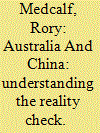

|
|
|
|
|
| Summary/Abstract |
Between 2016 and 2018, Australia’s perceptions of China underwent a significant reality check, with global implications. Australia has been a first mover in pushing back against Chinese foreign interference, including via new foreign influence and interference laws. The recalibration of Australia-China relations, and the events and policy debate that proceeded it, is instructive for other countries seeking to respond to the more assertive and coercive elements of Chinese foreign policy. This article sets out the drivers of Australia's reality check, presents a chronology of key events, and examines how Canberra can now move relations with Beijing forward under the conditions of the new normal that has been established.
|
|
|
|
|
|
|
|
|
|
|
|
|
|
|
|
| 2 |
ID:
185227
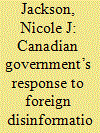

|
|
|
|
|
| Summary/Abstract |
In recent years, governments have considered how to respond to “disinformation.” However, there is little academic literature on Canada’s response in the area of security and foreign policy. This paper addresses this gap by analyzing how and why Canadian government foreign and security actors have “securitized” foreign disinformation. It argues that, since 2014, they have increased awareness about disinformation and transformed it into a matter of “security” through rhetoric and discursive framing, as well as stated policy intentions and actions. This has occurred in response to perceived threats, but without coherent policy. The findings suggest that challenges are linked to persistent difficulties in defining and understanding disinformation. The result has been fragmented actions, some of which may legitimate actions that deviate from “normal political processes.” The implications are that definitional challenges need to be addressed, the role of security actors assessed, and a clearly articulated and holistic strategy drawn.
|
|
|
|
|
|
|
|
|
|
|
|
|
|
|
|
| 3 |
ID:
181937
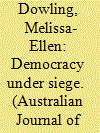

|
|
|
|
|
| Summary/Abstract |
In today’s virtually interconnected world, it is now cheaper, faster and less risky for malign foreign entities to conduct non-kinetic subversion of adversaries. This commentary aims to promote debate about whether digitisation has reshaped foreign interference or whether changes to the conduct of covert subversion operations simply mask what at its core is an unchanged and perennial fixture of geopolitics. It calls into question the concept of foreign interference in a world wherein the boundaries of foreign and domestic are beginning to dissolve in the digital theatre of battle. In this piece, I identify several core ways in which digitisation has revolutionised tactics of interference and argue that this differentiates today’s foreign interference from analogue-era espionage. I also explore how digitisation has expanded the range of potential threats and targets which has exacerbated the notorious cyber attribution problem and poses a unique threat to liberal democracies.
|
|
|
|
|
|
|
|
|
|
|
|
|
|
|
|
| 4 |
ID:
186785
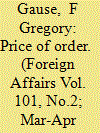

|
|
|
| 5 |
ID:
119278
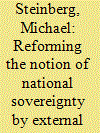

|
|
|
|
|
| Publication |
2013.
|
| Summary/Abstract |
In principle, national sovereignty is the right of a nation to govern its internal affairs without foreign interference. In practice, it is defined by one's interpretation of international law, which may permit legal external intervention under some circumstances, ultimately removing a nation's sovereignty. This paper will examine the current system of international law outlined by the United Nations, analyse the ambiguities contained within its Charter and elaborate on how external intervention can be justified. The case-study of recent developments related to Libya will demonstrate that the manner in which international law is interpreted is changing the notion of principles of sovereignty.
|
|
|
|
|
|
|
|
|
|
|
|
|
|
|
|
| 6 |
ID:
190449
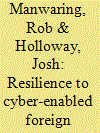

|
|
|
|
|
| Summary/Abstract |
Cyber-enabled foreign interference remains a key threat to many advanced industrial countries. In many cases, the security response has been to build “resilience” – cyber, national and, increasingly, democratic resilience – in line with whole-of-government and whole-of-society strategies. However, many of these securitised responses are “top-down” and elite driven. These resilience agendas do not pay sufficient attention to the views, concerns and threat-perceptions of citizens, potentially undermining their efficacy. In this article, we focus on the Australian case to better understand how citizen cyber skills, threat awareness, and perceptions of institutional capacity can inform democratic resilience to evolving cyber and information risks. We find strong evidence of a clear gap between citizen views and the securitised responses of governments in dealing with cyber-enabled foreign interference. A further issue from the Australian case is that citizens are framed as a passive strategic resource, rather than conceived of as a potentially substantive partner in a “joined-up” response.
|
|
|
|
|
|
|
|
|
|
|
|
|
|
|
|
|
|
|
|
|